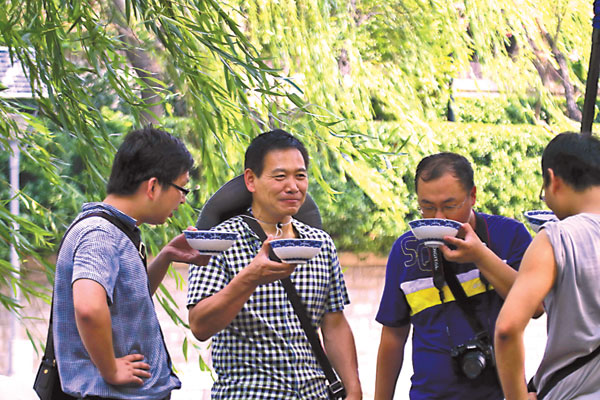Jinan is known for its natural springs. And these abundant water sources are giving new life to a disappearing tradition. Zhao Ruixue reports from the Shandong capital.
Tea shops and stalls were popular all over the country in harder times. They were convenient and cheap, and provided respite for the hardworking on hot dry summer days when the sun beat down mercilessly. Holding a big bowl of tea, passers-by could quench their thirst and mop their brows, relaxing a little while they sipped their drink.
 |
|
Dawan cha is the preferred beverage of choice by the side of Jinan city's famous springs. [Photo by Ju Chuanjiang / for China Daily] |
It was nothing fancy, just a diluted brew of low-quality tea sold at only 2 fen ($0.03). The dawan cha (big bowl tea) stalls were common enough along the streets, wharfs, factories and farms, and even by the rural fields.
But as the country got richer, and people's livelihood improved, the stalls gradually faded from popularity.
Fast-forward a few decades, and the scene sharpens again into focus.
By the side of the city moat running around Jinan, the Shandong capital, Wang Yiyan, an out-of-town visitor from Mudanjiang, Heilongjiang province, is cooling off in the shimmering heat with a large bowl of tea in his hands.
"It not only cools me down but gives me a taste of tradition," he says as he gulps down the bowl of tea.
It is a transplanted tradition, since dawan cha is more emotionally tied to Beijing, although it is very hard to find now in the bustling Chinese capital.
There is even a Beijing folksong that recalls the big bowls of tea sold in Qianmen, one of the nine gates of the Forbidden City.
The lyrics say it all:"When I am back in Beijing, I cannot help tasting the dawan cha of my childhood even though I have been away so long.
"There are hundreds of other beverages in the world, and our tea may cost the least, but its mellow taste clings to my memory no matter how far I wander."
 |
|
A tea stand beside Black Tiger Spring sells at least 300 bowls of dawan cha on weekdays and more during weekends. [Photo by Ju Chuanjiang / for China Daily] |
The big bowl tea definitely belongs to the common man. It is simple and unpretentious, and doesn't require the good manners or money invested in delicate purple clay teapots and the most expensive leaves. It is tossed back with gusto, drunk in large bowls, and its main function is to ease the tired and nourish the thirsty.
That is probably why there is now a tea renaissance in Jinan. Dawan cha is enjoying instantaneous popularity now that it has been re-introduced to the city of natural springs.
"We sell at least 300 bowls on weekdays and more during weekends," the tea stand owner at Black Tiger Spring says. His stand is simply equipped, with six tables, dozens of big bowls, three huge teapots, a disinfecting cabinet and several buckets to replenish the spring water supply when it runs out.
A yellow pennant with red letters flies high above the stall, greeting guests and telling them where they can enjoy a big bowl of tea.
But, the tea now sells for 2 yuan a bowl, still cheap considering that the average salary is now about 100 times more than in the 1980s when dawan cha cost 2 cents.
What makes the tea in Jinan special is the water, collected from famous springs around the tea stands.
"I heard that the tea brewed with spring water tastes different, so I wanted to try it while I am here," Zhang Guoliang from Jining says.
 |
|
A banner designed for a dawan cha stall in Jinan. [Photo by Ju Chuanjiang / for China Daily] |
The English corner held here each Sunday has attracted hundreds of people.
"It's a good place to get close to nature and people come here with their families, interact in the English corner, or taste the tea," says Craig Harter from the United States.
His friend Wang Chao adds: "It's a good combination of the traditional and the modern."
According to statistics from the Jinan government, the spring water is rich in trace elements and minerals, and good for health. That is why Jinan residents come here to collect water, every morning, religiously.
Yu Weimin, 71, is among them, and he travels to Black Tiger Spring by bus every day to collect the water.
There are dozens of small springs around the Black Tiger Spring and they all taste different, according to Yu.
"The water is softer and sweeter at a few of the springs," Yu says, speaking from experience. He has been using spring water since his childhood. "My mother cooked with spring water and we cleaned towels in the spring water."
He is still fascinated by the magic of the water. He says dirty towels can be totally cleaned in the spring water, without any soap at all.
"The springs are nature's gifts to Jinan," Yu says.
Contact the writer at [email protected].
